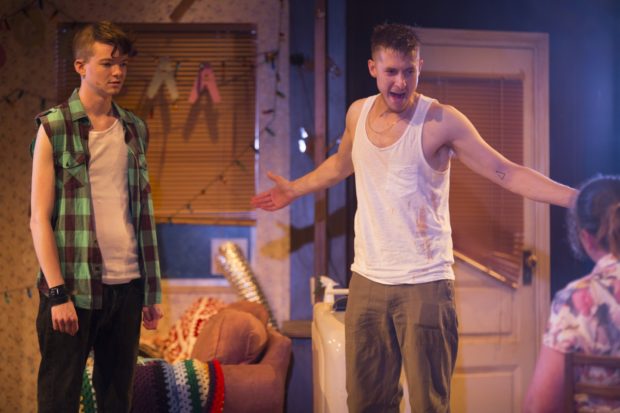You have no items in your cart. Want to get some nice things?
Go shopping
Despite rave reviews in New York, Taylor’s Mac Hir (pronounced here) has not been well received in London. Lyn Gardner in The Guardian has criticised it for veering “between kitchen-sink drama, sitcom and satire”. Dominic Maxwell in The Times writes that Mac’s “characters here are such makeshift vessels that it is hard to suspend your disbelief in any of this.” They are wrong to dismiss Hir; it is funny, very very funny. And not only is it funny: it is a self-aware, timely and important satire on the way in which gender and sexuality politics can become another weapon to exert control. Quite a point from a male playwright who prefers the gender pronoun judy.
The opening scene presents us with utter disorder: a shabby small-town Californian home covered in filth, clothes and rubbish. Arnold (not “Arthur” as Maxwell describes him – if he is going to dismiss Hir in as little as 382 words he at least ought to get the characters’ names right), played by Andy Williams, sits in a chair, in a nightgown and rainbow-coloured clown’s wig, his face covered in makeup. This was not the home Isaac (Arthur Darvill) left when he joined the military to work in Mortuary Affairs. Walking back in he observes: “It’s a fucking disaster in here.” “Honey, sit down. I have so much to tell you,” his mother Paige (Ashley McGuire) excitedly tells the visibly shocked Isaac. And by goodness she does.
Arnold has had a stroke that has left him severely brain-damaged. Maxine, Isaac’s younger sister, has now become Max (Griffyn Gilligan). And Paige, after years of abuse at the hands of Arnold, has become Queen Bee: she humiliates and abuses in turn the once hyper-masculine Arnold, who she now feeds oestrogen; she allows Max to quit school; and she holds all sorts of new theories and views on gender:
What you think you know, you do not know. There are no longer two genders. No longer simply a Y and X chromosome but an alphabet of genders. They call it the LGBTTSQQIAA community. Or what I call the gender of Lugabuttsqueehah. In these new genders, exists new pronouns. Max is no longer a she or a he. So you call Max, ze. You must use ze instead of the pronouns he or she and you must use the pronoun hir, H.I.R in place of the pronouns her or him.[…] Ze wants you to refer to hir as a hir or a ze. Ze also gets upset if you emphasise the ze as if commenting on the pronoun when speaking to hir.[…] Ze wants you to say ze or hir as if this had been part of your regular speaking vocabulary your entire life. Any breach in decorum will cause hir to write in hir blog about how awful hir troglodyte fascist hetero-normative mother is. It’s fantastic.
But it is fantastic for only as long as Max plays the game, humiliating Arnold and deferring to hir mother, which – predictability – ze does not do. Gender politics – once used to oppress Paige – has become the very weapon by which she seeks to control those around her. When, towards the end of the play, Max warns hir mother “don’t tell me what I am”, Paige replies: “Why are you acting so butch all of a sudden? Where did my sissy transman go?”
It is true, as Lyn Gardner describes, that you cannot put Hir in a traditional generic box. But surely this is exactly the point? For all its sly subversion of gender and sexuality politics, Hir does not dismiss them; Max is never ridiculed for transitioning and we feel proud of Paige for finding a way to liberate herself by finding a job and achieving agency: “After years of mollifying my own strength in fear of him, I started to change myself.” People nor plays should be shoehorned into boxes; innovation often emerges from confluence and from rejecting the straitjacket of pre-defined boundaries. And innovation is exactly what you find here – an “absurd realism”, as Mac calls it, whereby absurdity and realism inform each other, but with the volume turned up.
Maxwell, on the other hand, is wrong to describe Hir’s characters as makeshift vessels. There are no empty stereotypes here – there are types, of course, like you will find in any piece of literature, but they are fizzing with energy and ideas (with the exception of Arnold who has been muted and disabled by the stroke). It is also naive and silly to expect a suspension of disbelief – it is too funny and too political. Indeed, nothing seems to escape scrutiny: the financial absurdity of American college system, the treatment of soldiers with PTSD, teenagers on social media and gluten-free diets all have a swipe taken at them.
The acting is exemplary. Ashley McGuire owns the show – her pace, timing, emphasis, movement and energy were outstanding. Arthur Darvill convincingly captures the nervous and explosive energy of a traumatised soldier. Griffyn Gilligan and Andy Williams are also excellent.
Ignore The Guardian and The Times and listen to Litro: go and see Hir.
Hir continues at the Bush Theatre until July 22. Tickets available from £10.

About Emily Bueno
Emily Bueno has an M.Phil in literature from Trinity College, Dublin. She has written for the Telegraph Culture section and the TLS. She is a trainee solicitor and lives in London.




